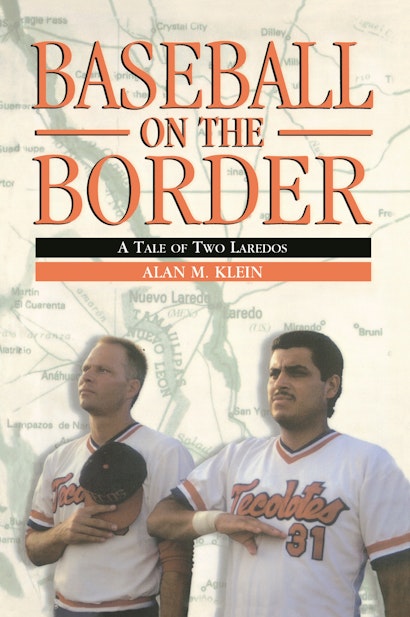From 1985 to 1994 there existed a significant but unheralded experiment in professional baseball. For ten seasons, the Tecolotes de los Dos Laredos (The Owls of the Two Laredos) were the only team in professional sports to represent two nations. Playing in the storied Mexican League (an AAA affiliate of major league baseball), the “Tecos” had home parks on both sides of the U.S.-Mexico border, in Laredo, Texas and in Nuevo Laredo, Tamaulipas. In true border fashion, Mexican and American national anthems were played before each game, and the Tecos were operated by interests in both cities. Baseball on the Border is the story of the rise and unexpected demise of this surprising team.
For Alan Klein, a cultural anthropologist specializing in sport, “the border” is almost a nation of its own. Having formed teams of players from both sides of the Rio Grande for almost a century, organizers and followers of the “Border Birds” often join forces but just as frequently squabble with each other in a chronic border tension. Throughout the book, Klein includes firsthand observations of the team and descriptions of its players. Readers will meet Dan Firova, the Tecos’ beleaguered manager, a border-region native who nevertheless finds himself a target of the Mexican media. The “Ugly American,” Willie Waite, is a young pitcher whose stunning success does nothing to diminish the disdain he has for his Mexican teammates. Ernesto Barraza, “The Trickster,” once threw a no-hitter on only seventy-three pitches (on April Fool’s Day, appropriately enough), but occasionally shows up at the park missing part of his uniform. And then there is Andres Mora, an aged slugger who, despite three seasons in major league baseball and a life of personal excesses, came within a few home runs of setting the all-time Mexican League record.
This is just part of the roster of the Tecos and only a fraction of the lineup of Baseball on the Border. Anyone with an interest in baseball will be enlightened and entertained by this informative book.
Awards and Recognition
- Winner of the 1997 Book of the Year, North American Society for the Sociology of Sport
Alan M. Klein is Professor of Sociology and Anthropology at Northeastern University. He is the author of Sugarball: The American Game, The Dominican Dream, and Little Big Men: Bodybuilding Subculture and Gender Construction.
"This work is a superb lab experiment in the hands of a competent anthropologist like Klein as he tries to separate fantasy from reality in this dual cultural baseball experiment.... An excellent book."—Bill Kirwin, Nine: A Journal of Baseball History and Social Policy Perspectives
"[Klein] does a fine job of reporting, and his prose is muscular, insightful, even witty."—Jon Caroulis, Philadelphia Inquirer
"The book is very well written. . . . It contributes greatly to the literature on the cultural basis of sport, to our understanding of the manner in which cultural inventions reflect national identity and processes, and substantiates an important insight to the idea that sport may provide a window to ongoing social change."—Carlos Velez-Ibañez, American Anthropologist
"Few studies of this nature exist. Klein's general argument about tri-nationalism and sports is interesting, and he has also provided enough historical context and in-depth material on social relationships to make a solid addition to studies of the border and Southwestern race relations, as well."—Douglas E. Foley, University of Texas at Austin
"This stimulating and insightful book enlarges our understanding of nationalism and identity in a borderlands context. Klein skillfully uses baseball and ethnography to get at the dynamics of international relations as well as the harmonious and conflictive interaction among Mexicans, Anglo Americans, and Mexican Americans. A must read for scholars and aficionados of the workings of border society."—Joseph Arbena, Clemson University
"With Klein's Baseball on the Border we are treated to a glimpse of what an astute observer of social life, popular culture, and sport can teach us about larger cultural issues. With a sensitive eye for detail, a nuanced understanding of culture, and conceptual acumen, Klein provides a fascinating account of baseball as a transnational phenomenon. Not only do we learn about how baseball is played within the context of these diverging cultures, but we also learn about the structural dimensions of nationalism and how this gets borne out through sport."—Patricia A. Adler, University of Colorado, and Peter Adler, University of Denver
"Read this book, enjoy the characterizations of the players, managers, and administrators ... listen to the crowd cheer for their home town heroes, and pause to think, as Klein paints the picture with a masters stroke, of what this [book] can tell us about transnational relations and the impact of sport."—Patricia A. Adler and Peter Adler, authors of Backboards and Blackboards

